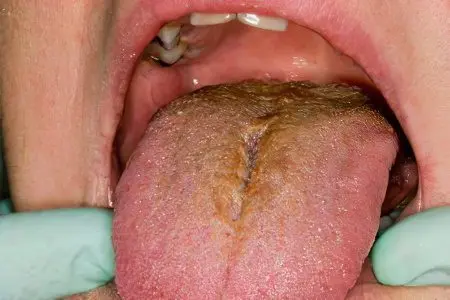Contents
Brown coating on the tongue is the formation on the mucous membrane of the organ of the substrate of various thicknesses, stability and density, which has a brown tint. This plaque consists of dead epithelial cells, bacteria, microbes, the smallest pieces of food. Normally, in a healthy person, the tongue is rough on the upper side and has a pink color. The papillae that are on its surface and are responsible for the taste buds have a grayish tint. Therefore, if a brown coating has formed on the tongue, then this indicates health problems.
Causes of brown coating on the tongue

If a person goes to the doctor with a complaint about the appearance of a brown coating, then first of all he will be checked for the presence of gastrointestinal diseases. This is due to the fact that in this way the reaction of the receptor apparatus to the presence of pathology of the stomach, gallbladder, pancreas and intestines is most often manifested. However, sometimes the gastroenterologist does not find problems with the gastrointestinal tract in the patient.
Therefore, among the reasons that cause the appearance of brown plaque, the following can be distinguished:
Corrosive or fibrous gastritis. The cause of corrosive gastritis is the ingestion of acidic or alkaline solutions, as well as radioactive substances, on the gastric mucosa, which causes irritation and inflammation of its membrane. Fibrous gastritis occurs after or during illness, in particular, with sepsis, typhoid, scarlet fever.
Inflammation of the intestines, both large and small (enterocolitis).
Crohn’s disease.
Stomach ulcer.
Dysbacteriosis of any etiology.
Reflux.
Cholecystitis.
Hepatitis.
Dehydration of the body.
Diarrhea.
Biliary dyskinesia.
Duodenitis.
Progressive oral candidiasis. Brown plaque has a whitish tint and appears at advanced stages of the disease.
Diseases of the pulmonary system.
Blood diseases that are hereditary autoimmune in nature (hemolytic anemia, erythropoietic uroporphyria).
Addison’s disease. Requires treatment by an endocrinologist, as it is associated with chronic adrenal insufficiency.
Hypovitaminosis, namely the lack of vitamin B3.
Taking medications, such as antibiotics.
Smoking, especially in large quantities. Plaque is formed as a result of the fact that phenols, which are part of cigarette smoke, act on the epithelium of the tongue.
Inflammation of the joints.
Alcoholism.
progressive stomatitis. At the initial stages, the plaque has a white color, however, if adequate therapy is ignored, the tongue will be covered with a brown film.
Symptoms of brown coating on the tongue
The appearance of a brown coating on the tongue is a symptom of a particular disease. However, sometimes plaque can be easily brushed off with a toothbrush, appear once, or extremely rarely and only in the morning. In this case, you should not be seriously concerned, since the presence of a light brown coating is a kind of norm and can only indicate that the day before the person consumed too spicy, salty or fried food, or alcohol. Plaque may appear after coffee or chocolate taken orally. If, after removing the plaque, it does not form again, then you should not worry about this.
Sometimes, after holding out for about a week, the raid passes on its own, and the person does not make any complaints. This indicates that the body coped with the inflammatory process on its own. In this case, it is best to consult a doctor and identify the possible presence of problems with the gastrointestinal tract or other organs.
Plaque can have a different consistency. It can be lean or oily, wet or dry. Depending on this, it is possible to determine the degree of progression of the disease. An additional sign of the severity of a particular pathology is the ease of separation of plaque from the tongue. The more difficult it is to remove, the further the disease has gone.
Treatment of brown plaque on the tongue
As such, there is no specific treatment for brown plaque on the tongue. Brown plaque is a symptom of a particular disease, eliminating which, it will be possible to get rid of the substrate on the receptor organ.
If candidiasis has led to the formation of plaque, then it is necessary to treat it with antifungal agents. Gastrointestinal problems are treated by a gastroenterologist, depending on their complexity, nature and stage of the disease.
In order to make up for the deficiency of vitamin B3, it is necessary to consume liver, eggs, yolks, buckwheat, milk, beets, peanuts. After consultation, the doctor may additionally prescribe vitamin B3.
If, in addition to plaque, a person does not experience any accompanying symptoms, you can try to remove it with a toothbrush. To do this, it must have a special ribbed side. It is necessary to carry it from the root of the tongue to its tip, but without going too deep, otherwise you can cause a gag reflex. Don’t push too hard to avoid damaging it.
Prevention of brown plaque on the tongue
There are general preventive measures to prevent the appearance of brown plaque and get rid of it if it is not a consequence of the pathology of any organ or organ systems.
These include the following:
Maintain immunity.
To eat healthy food.
Include fiber in your diet.
Limit fried, salty, spicy foods and alcohol.
Consume natural dairy products.
Take B vitamins.
Do not drink coffee and black tea, replacing them with herbal teas.
Perform daily oral hygiene.
Stop smoking tobacco.
Support the intestinal microflora.
All these measures will prevent the appearance of a brown coating on the tongue. In the event that brown deposits appear regularly and are not brushed off with a toothbrush, it is necessary to consult a doctor for advice and possible treatment.









